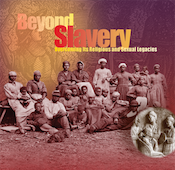Beyond Slavery
Explore the Conference
Explore the Conference by Subject
Slavery in Christian, Jewish, and Muslim Scripture and Religious Law
Christianity, Religion of the Slaveholders and the Enslaved
Sexual Assault and Exploitation Under U.S. Slavery and Jim Crow
How Slavery Has Shaped Our Understandings of Marriage and Friendship
Slavery, Violence, and the State
Beyond Slavery:
Overcoming Its Religious
& Sexual Legacy
David Wright:
"She shall not go free as male slaves do": The Female Debt-Slave in the Hebrew Bible
The Hebrew Bible, as part of ancient Near Eastern literature, considers slavery a valid social and economic institution. Abraham and the other exemplars of piety in Genesis owned slaves. God is even said to have blessed these men by providing them with slaves.
So how are we, today, to make ethical sense of this positive acceptance of slavery, and of God's apparent role in it?
One important step is to recognize the Bible as a human document, based on other human documents. It was created within particular historical circumstances for particular political, ideological, and social purposes, and was rewritten again and again over time.
If we could recognize the ways in which the Bible expresses its writers' ideals and the goals—ideals and goals specific to the age the writers lived in and tied to the customs and expectations of their time—then we could realize the impossibility of simply applying biblical laws to our own society, regardless of how they encourage exploitation or limit individual physical, social and sexual freedoms. We could, indeed, adopt the method of the biblical law writers themselves: instead of sticking to the literal dictates of the texts they inherited, these authors questioned them.
This video was recorded on October 15-16, 2006 as part of the conference, "Beyond Slavery: Overcoming Its Religious and Sexual Legacy." It was sponsored by the Feminist Sexual Ethics Project in the Near Eastern and Judaic Studies Department at Brandeis University.
